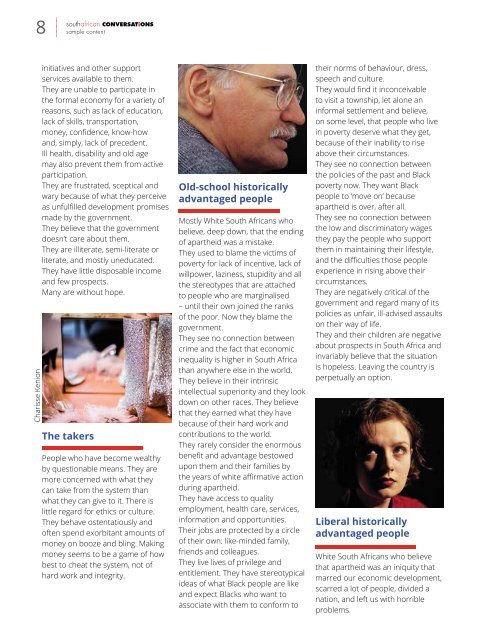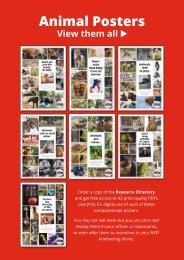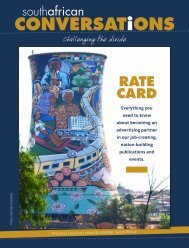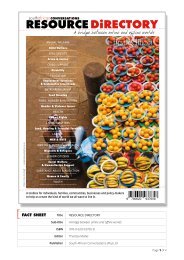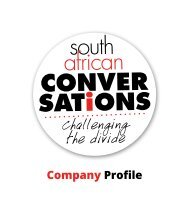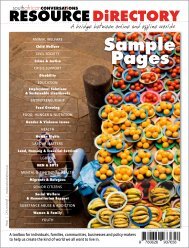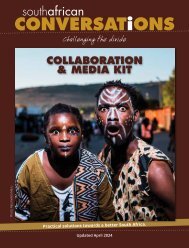South African Conversations sample articles
Insight into who we are as a people. Empowering, practical information. A platform for people who are otherwise voiceless. Suggestions for action by individuals, families, concerned onlookers, businesses and policy-makers to help create a better world for all of us. The South African Conversations magazine is a source of practical, solutions-oriented information. It empowers individuals, families and communities, raises awareness about the lived reality of people who are marginalised, and suggests options for action by concerned onlookers, businesses and policy-makers. The magazine is for sale exclusively by unemployed people who earn 50% of the cover price. Our distribution network is through NPOs across South Africa. These Distribution Hubs earn 17% of the cover price for supplying magazines to sellers and negotiating safe sales spaces for them in places with high levels of affluent foot traffic. Enjoy these sample articles and look for opportunities sprinkled throughout to collaborate with us.
Insight into who we are as a people. Empowering, practical information. A platform for people who are otherwise voiceless. Suggestions for action by individuals, families, concerned onlookers, businesses and policy-makers to help create a better world for all of us.
The South African Conversations magazine is a source of practical, solutions-oriented information. It empowers individuals, families and communities, raises awareness about the lived reality of people who are marginalised, and suggests options for action by concerned onlookers, businesses and policy-makers.
The magazine is for sale exclusively by unemployed people who earn 50% of the cover price. Our distribution network is through NPOs across South Africa. These Distribution Hubs earn 17% of the cover price for supplying magazines to sellers and negotiating safe sales spaces for them in places with high levels of affluent foot traffic.
Enjoy these sample articles and look for opportunities sprinkled throughout to collaborate with us.
You also want an ePaper? Increase the reach of your titles
YUMPU automatically turns print PDFs into web optimized ePapers that Google loves.
8<br />
southafrican CONVERSATiONS<br />
<strong>sample</strong> content<br />
Charisse Kenion<br />
initiatives and other support<br />
services available to them.<br />
They are unable to participate in<br />
the formal economy for a variety of<br />
reasons, such as lack of education,<br />
lack of skills, transportation,<br />
money, confidence, know-how<br />
and, simply, lack of precedent.<br />
Ill health, disability and old age<br />
may also prevent them from active<br />
participation.<br />
They are frustrated, sceptical and<br />
wary because of what they perceive<br />
as unfulfilled development promises<br />
made by the government.<br />
They believe that the government<br />
doesn’t care about them.<br />
They are illiterate, semi-literate or<br />
literate, and mostly uneducated.<br />
They have little disposable income<br />
and few prospects.<br />
Many are without hope.<br />
The takers<br />
People who have become wealthy<br />
by questionable means. They are<br />
more concerned with what they<br />
can take from the system than<br />
what they can give to it. There is<br />
little regard for ethics or culture.<br />
They behave ostentatiously and<br />
often spend exorbitant amounts of<br />
money on booze and bling. Making<br />
money seems to be a game of how<br />
best to cheat the system, not of<br />
hard work and integrity.<br />
Old-school historically<br />
advantaged people<br />
Mostly White <strong>South</strong> <strong>African</strong>s who<br />
believe, deep down, that the ending<br />
of apartheid was a mistake.<br />
They used to blame the victims of<br />
poverty for lack of incentive, lack of<br />
willpower, laziness, stupidity and all<br />
the stereotypes that are attached<br />
to people who are marginalised<br />
– until their own joined the ranks<br />
of the poor. Now they blame the<br />
government.<br />
They see no connection between<br />
crime and the fact that economic<br />
inequality is higher in <strong>South</strong> Africa<br />
than anywhere else in the world.<br />
They believe in their intrinsic<br />
intellectual superiority and they look<br />
down on other races. They believe<br />
that they earned what they have<br />
because of their hard work and<br />
contributions to the world.<br />
They rarely consider the enormous<br />
benefit and advantage bestowed<br />
upon them and their families by<br />
the years of white affirmative action<br />
during apartheid.<br />
They have access to quality<br />
employment, health care, services,<br />
information and opportunities.<br />
Their jobs are protected by a circle<br />
of their own: like-minded family,<br />
friends and colleagues.<br />
They live lives of privilege and<br />
entitlement. They have stereotypical<br />
ideas of what Black people are like<br />
and expect Blacks who want to<br />
associate with them to conform to<br />
their norms of behaviour, dress,<br />
speech and culture.<br />
They would find it inconceivable<br />
to visit a township, let alone an<br />
informal settlement and believe,<br />
on some level, that people who live<br />
in poverty deserve what they get,<br />
because of their inability to rise<br />
above their circumstances.<br />
They see no connection between<br />
the policies of the past and Black<br />
poverty now. They want Black<br />
people to ‘move on’ because<br />
apartheid is over, after all.<br />
They see no connection between<br />
the low and discriminatory wages<br />
they pay the people who support<br />
them in maintaining their lifestyle,<br />
and the difficulties those people<br />
experience in rising above their<br />
circumstances.<br />
They are negatively critical of the<br />
government and regard many of its<br />
policies as unfair, ill-advised assaults<br />
on their way of life.<br />
They and their children are negative<br />
about prospects in <strong>South</strong> Africa and<br />
invariably believe that the situation<br />
is hopeless. Leaving the country is<br />
perpetually an option.<br />
Liberal historically<br />
advantaged people<br />
White <strong>South</strong> <strong>African</strong>s who believe<br />
that apartheid was an iniquity that<br />
marred our economic development,<br />
scarred a lot of people, divided a<br />
nation, and left us with horrible<br />
problems.


